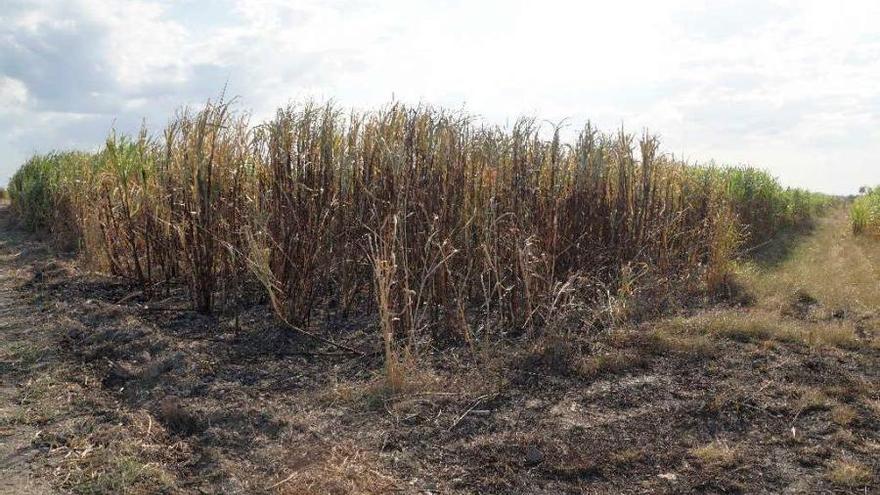
![]() 14ymedio Havana, 22 August 2023 — A person residing in Sancti Spíritus was sentenced to 15 years in prison by the State Security Crimes Chamber of the Court of Villa Clara for burning three sugar cane plantations in January, the official press reported on Monday. Accused of sabotage, the man, whose identity was not revealed by the authorities, managed to set fire to 102.5 tons of cane.
14ymedio Havana, 22 August 2023 — A person residing in Sancti Spíritus was sentenced to 15 years in prison by the State Security Crimes Chamber of the Court of Villa Clara for burning three sugar cane plantations in January, the official press reported on Monday. Accused of sabotage, the man, whose identity was not revealed by the authorities, managed to set fire to 102.5 tons of cane.
According to the official newspaper Escambray, the three fires took place on January 23: two of them in the rural area of Jatibonico and another in Cabaiguán, located in the provincial section of the Central Highway. The person in charge moved from one field to another on a scooter (a modified motorcycle for passenger transport) and set fire to the cane using matches.
In the first municipality, the individual managed to reduce to ashes a complete plantation of over 37 acres. In the second, where he was captured by police after a telephone call from local farmers, he burned 1.2 acres. On both occasions, the fire was contained by the workers in charge of the crops.
The accused must not only serve the prison sentence but also pay fines for damages in the amount of 79,000 pesos. The press did not reveal whether, during the trial, the man explained why he wanted to burn the cane, but he did emphasize that the intention was to damage the State’s property.
“This citizen conceived and put into action the idea of impacting the sugar harvest, which has a high economic priority for the State and to which it allocates material and financial resources – some of these imported – in the midst of many limitations,” said Pedro Espinosa, the Villa Clara prosecutor.
Escambray says that the crime is similar to terrorist acts promoted “by the Government of the United States, in the 1960s,” when a series of saboteurs tried to collapse the country’s economic infrastructure, with the aim of causing the fall of Fidel Castro’s government. In any case, the newspaper points out, it is a blow to “the national economy, which today is on crutches.”
The investigation ruled out any link between the accused and other people or organizations, and found no connection between these fires and the disconnection of the National Electricity System in the center and east of the Island, which happened last February at a point between Jatibonico and Ciego de Ávila.
However, they warned that the case is not yet closed, and the events will continue to be investigated. Likewise, the accused can file an appeal for annulment, which obligates the court to review the sentence.
Recently, economic crimes against state property have increased, especially those related to the food industry. This August, a former custodian of the Mario Muñoz sugar plant, in Matanzas, was sentenced to four years in prison for allowing the theft of three sacks of sugar and accepting a bribe of 3,000 pesos.
The 23-year-old was also fined for the value of the stolen sugar. His collaboration with the authorities and lack of a criminal record reduced his sentence to the minimum for that crime. Another 12 factory workers have been sanctioned for theft or complicity this year.
According to the provincial authorities, the penalties were established “with the necessary severity,” which included sentences of periods in prison, house confinement, correctional work without internment and fines for the value of the stolen product.
Officials said that the robberies have significantly affected the productivity of the industry and the presence of sugar in the rationed ’basic basket’, and that, they explain, constitutes a violation of the rights of citizens. “The crime must be identified in time and punished with the necessary rigor, because, when it comes to protecting the property of the people, any measure is too small.”
The state sensitivity to these crimes comes from the fiasco that is expected from this year’s harvest. In Sancti Spíritus, for example, by this July, barely 30% of the harvest plan of the spring campaign (from January to June) had been planted. Cuba, a country that historically led the export of sugar to the world, now fails to satisfy its own domestic consumption. Last May, the Government warned that production had barely reached 350,000 tons, well below the 400,000 required for the population and the Island’s industries.
Translated by Regina Anavy
____________
COLLABORATE WITH OUR WORK: The 14ymedio team is committed to practicing serious journalism that reflects Cuba’s reality in all its depth. Thank you for joining us on this long journey. We invite you to continue supporting us by becoming a member of 14ymedio now. Together we can continue transforming journalism in Cuba.
